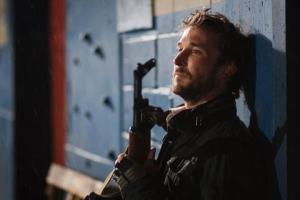
TNT
One of the hoariest sci-fi tropes is the invading alien race that wants our women (or occasionally, to mix it up, our men). It never held up much to logical scrutiny; rare is the viewer who has, in turn, looked at a scary reptilian space creature and thought “mmm, I’d like to get me some of that.” (That it was able to put a human in the role of the invader looking for interspecies sumpin’-sumpin’ was an overlooked advance of Avatar.)
Alien invaders have to want something, though, and hungering for our mineral deposits doesn’t have quite the same emotional tug. TNT’s non-groundbreaking but absorbing new drama, Falling Skies (two-hour premiere Sunday night) finds a worthy replacement, as did Torchwood: Children of Earth in 2009: the aliens who want our kids.
We join humanity on the outskirts of Boston, six months after an alien attack wiped out Earth’s major cities and most of its humans. A fleet of motherships arrived, knocked out our electronics with a pulse, and disgorged billions of reptilian/insectoid creatures—”skitters,” the survivors call them–backed up by fearsome robot warriors. The skitters swarmed the Earth, slaughtering adults but sparing teenagers, whom they “harnessed” by attaching a kind of biomechanical spine to their backs which enslaves them. They use their armies of teen zombies for menial labor, the purpose of which is not clear–but in the meantime, they’re mopping up humanity’s remaining pockets of resistance.
The pocket we’re concerned with is the 2nd Massachusetts, a militia of about a hundred fighters protecting around 200 civilians. (Humans have been dispersing into smaller groups to avoid detection.) Tom Mason (Noah Wyle) is a history professor whose wife died after the attack and has three sons–the middle one of whom was harnessed weeks ago. Using his study of military history to aid the 2nd Mass commanders, Tom tries to find a plan of resistance while acting as the voice of the civilians–and trying to get his son back.
The most obvious point of comparison for Falling Skies (executive produced by Steven Spielberg, like fall’s upcoming Terra Nova) is recently departed alien-invasion remake V, but really the series falls best in the category of postapocalyptic survival story, with the likes of Jericho, The Walking Dead and Battlestar Galactica. Which is not to say it’s the same as those very different series.
In terms of tone and general grimness, it’s at the midpoint between Jericho and The Walking Dead–it pulls fewer punches than the CBS post-nuke series, but stays well away from the true hellscape of AMC’s zombie story. Whereas The Walking Dead posits that the fight against beastly anarchy is a hard and possibly losing battle, Falling Skies shows the remnants of Massachusetts hanging together, except for some bad apples.
In terms of quality, it’s closer to Jericho than BSG. Falling Skies is not, nor does it appears to want to be, a series of deep characters and big ideas. Like Jericho, it has a sentimental streak, and seems determined to undercut the grimness with Hallmark moments. Most of the secondary characters–sweet kids, gruff soldiers–are as flat as postapocalypse Boston, and even a non-postapocalypse buff will see some of the “twists” of later episodes coming.
Wyle becomes convincing as a thoughtful but tough rebel leader–maybe it’s the beard–but Tom is not exactly the most complex protagonist in sci-fi history. “History professor and caring dad” sums him up, and his constant war-history parallels–to the Greeks, the Romans, the American revolution–become almost a running joke. (The only character in the series who truly pops is Pope, played by Colin Cunningham, the leader of a predatory gang, who tells Tom the correct analogy is not the Yanks against the British, but the Indians about to be annihilated by the Europeans.)
And the skitters? Like the characters under attack, we know little about who the invaders are, what specifically they want, how they talk or how they think. We learn as they do, and from the hints we get, it doesn’t look like we’re going to get the interrogations of faith, consciousness, morality and freedom that BSG and its complex Cylons gave us. (There is a certain amount of tension between the rights of civilians and the exigencies of the military, as in BSG, but it’s definitely the lite version.)
Actually, the closest comparison I might make would be to Jericho in its short final season, when it quickened its pace, pared some plots and gave us a starker sense of its stakes. And mind you, I say this as someone who watched every episode of Jericho (not out of work obligation), so when I say that Falling Skies is not a great show, it doesn’t mean it’s not an entertaining one.
Because within Falling Skies’ limited ambitions is some decent popcorn entertainment. The special effects are strong for TV, much less basic cable (the show doesn’t skimp on full-monty sights of the skitters). There are intriguing questions about the invaders. (Why do they build human-like robots? Why would they come so far for subminimum-wage teen labor? Why haven’t they wiped out humanity wholesale with nukes, which seems within their capability?)
And as sentimental, even sappy, as the show can be, the theme of protecting children is not just a source of endless child-in-peril scenes (though it is that). It’s also about all the hopes that people in the worst of times invest in another generation (which was the theme, in far, far starker terms, of Cormac McCarthy’s The Road).
I doubt Falling Skies will ever inspire deep reflection on what it all means, but–as I can attest, having plowed through six episodes despite my skepticism–it at least made me want to know what happens next. If a postapocalypse can’t do that, what’s a postapocalypse for?


